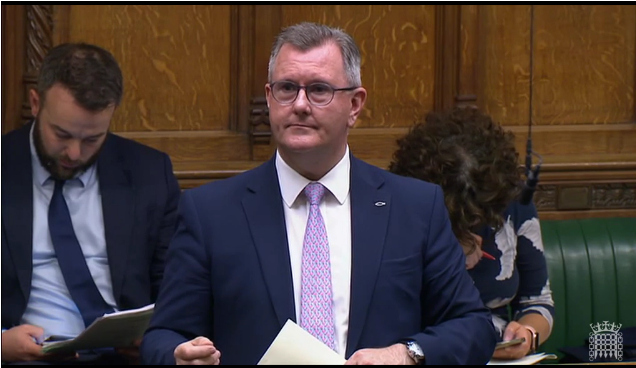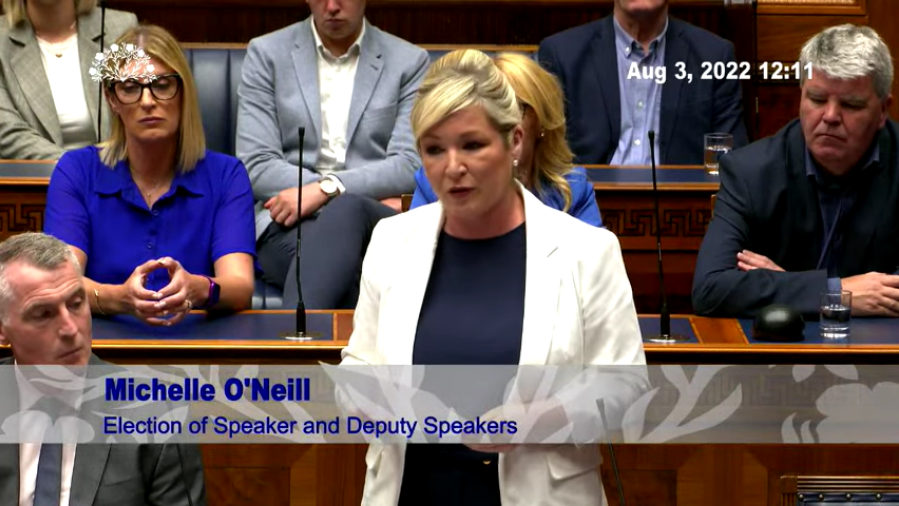Brexit & Beyond Newsletter
8 August 2022

Welcome to the 8 August 2022 Brexit & Beyond newsletter
The UK Government’s Northern Ireland Protocol Bill has passed its stages in the House of Commons. The European Commission has launched further legal action against the UK. The NI Assembly was recalled last week but did not elect a Speaker. UK Parliament reports on the Protocol on Ireland/Northern Ireland, Common Frameworks, and Retained EU law have been published.
The newsletter will be back in September. Have you been forwarded this email by a colleague or friend? You can sign up directly on our webpage.
Northern Ireland Protocol Bill proceeds to the Lords
The Northern Ireland Protocol Bill passed committee stage in the House of Commons in July. At third reading, MPs passed the Bill by 267 votes to 195 and it now proceeds unamended to the House of Lords, where it is likely to meet stronger opposition in the autumn. The Northern Ireland Protocol Bill would disapply core parts of the Protocol relating to trade in goods, subsidy control, the role of the Court of Justice of the EU, plus allow changes to VAT. The Bill was considered in Committee of the whole House which means all MPs could take part in debates and votes on the Bill’s content. This procedure is usually favoured for Bills of constitutional or ethical importance. It was debated for the first time in committee on 13 July, the second day and third day of committee stage were held on 19 and 20 July.

Sir Jeffrey Donaldson speaking in the Commons on the NI Protocol Bill | Source: UK Parliament
Various amendments were brought by opposition parties (including the Alliance party and SDLP). These included amendments to require the UK Government to set out its legal justification for the Bill, to protect the democratic consent provisions in the Protocol (article 18) in their current form, to require consultation with NI businesses, the EU and approval by the Assembly on the dual regulatory regime, and to require support from the NI Assembly for the Act before it comes into force. All amendments were defeated.
In June, the Commons Northern Ireland Affairs Committee held an evidence session on the Bill with international law experts, Professor Holger Hestermeyer and Professor Alan Boyle. The Scottish Parliament passed a motion calling on the UK Government to withdraw the Northern Ireland Protocol Bill and concentrate its efforts on negotiations with the EU. Cabinet Secretary for Constitution, External Affairs and Culture Angus Robertson wrote to the Foreign Secretary , saying it is “inconceivable” that the Scottish Government would support a legislative consent motion for the Bill. In the UK Government’s quarterly report on intergovernmental relations (published 21 July), it states that former Minister for Europe and North America James Cleverly spoke with Ministers from the Scottish and Welsh Governments “to set out the UK Government’s position on the Northern Ireland Protocol ahead of the Foreign Secretary’s statement to Parliament”. The Foreign Secretary also wrote to Scottish and Welsh ministers, and the Permanent Secretary of the Northern Ireland Executive, ahead of the Bill’s introduction.
In June, Queen’s University published its latest ‘Testing the Temperature’ polling on the Protocol. While 57% disagreed that the UK Government would be justified in taking unilateral action to suspend elements of the Protocol, 38% believe that it would be justified in doing so. QUB Research Fellow Dr Lisa Clare Whitten has published an explainer of dynamic regulatory alignment under the Protocol, 18 months since it came into force. The Institute of International and European Affairs has published an article written by former Director of International Relations for the Northern Ireland Executive Office Dr Andrew McCormick on the Northern Ireland Protocol Bill. He argues the Bill is “internally contradictory, in that it adopts a one-sided analysis of the Belfast/Good Friday Agreement while arguing that it is needed to uphold that Agreement.”
NI Assembly recalled
On 3 August the Northern Ireland Assembly was recalled following a motion brought by the SDLP on the cost of living crisis. The first item of business for the sitting was election of a Speaker and deputy Speakers. Speaking on this item, Brian Kingston (DUP) said that the progression of the legislation in the Commons is “welcome recognition of the destructive impact of the protocol on political, constitutional and economic life in Northern Ireland. However, only with its passage undiminished can our institutions be freed from the dark shadow of the protocol. That point has not yet been reached, and we will assess the views of any future new Prime Minister before taking any further action.”
Michelle O’Neill (Sinn Féin) and others in the chamber urged the DUP to form the Executive. She said, “I listened to Jeffrey Donaldson on the radio this morning talk about how things are all fine and dandy, everything is great in Departments and they have budgets with which to do the business. That is not true…Departments face increasing financial pressure in delivering public services as a result of the significant rise in energy costs, coupled with the need to respond to the cost-of-living crisis that faces households and businesses…All your actions will not wash away the Protocol.”

Michelle O’Neill speaking in the chamber last week | Source: NI Assembly
Matthew O’Toole (SDLP) referred to a report from the National Institute of Economic and Social Research (NIESR), which says the protocol is one of the reasons why Northern Ireland is outperforming the rest of the UK economically. Kate Nicholl (Alliance) said, “The truth remains that any negotiation and any changes to the Northern Ireland Protocol can be done only between Westminster and the EU.” Jim Allister (TUV) said, “If the Protocol — as it is — is wholly incompatible with our constitutional position as an integral part of the United Kingdom, it follows that no unionist can be a party to that.”
A Speaker was not elected (cross-community support is required). QUB’s Professor Katy Hayward explains that according to new UK legislation, if the Executive is not restored by 28 October, caretaker ministers cease to hold office and the Secretary of State for Northern Ireland must call an election within 12 weeks (this means an election could take place as early as 24 November 2022 and no later than 19 January 2023).
European Commission launches further legal action
On 22 July, the European Commission launched four new infringement procedures against the UK for “not complying with significant parts of the Protocol on Ireland / Northern Ireland”. This is in addition to the infringement procedures previously launched on 15 June 2022. The Commission says “in a spirit of constructive cooperation”, it refrained from launching certain infringement procedures but the progress of the NI Protocol Bill through the Commons and “the UK’s unwillingness to engage in meaningful discussion” go against this spirit.
The Commission has launched four infringement procedures regarding: the failure to comply with applicable customs requirements, supervision requirements and risk controls on goods moving NI-GB, which the Commission says “significantly increases the risk of smuggling via Northern Ireland”; failure to notify the transposition of EU legislation laying down general EU rules on excise duties; failure to notify the transposition of EU rules on excise duties on alcohol and alcoholic beverages; and failure to implement EU rules on Value Added Tax (VAT) for e-commerce. The Commission says these latter issues pose a fiscal risk to the EU. The UK has two months to reply to the letters requesting it to take swift remedial action. The Commission has published a Q&A on the new infringement procedures against the UK.
EUR-Lex, an official website of European Union law and other public documents of the EU, has published a new webpage on the Protocol on Ireland/Northern Ireland, which includes a search link for Protocol related documents, key documents relating to the agreement, and summaries of EU legislation. In its proposals of October 2021 on engagement with Northern Ireland, the European Commission stated, “The Commission is working on setting up a website that would in a clear and comprehensive way show the EU legislation applicable in Northern Ireland (covering also the dynamic alignment aspect). That will significantly contribute to greater transparency for the people of Northern Ireland.”
On 6 July, the European Parliament debated ‘the UK Government’s unilateral introduction of the Northern Ireland Protocol Bill and respect for international law’.
Lords Sub-Committee follow-up report on the Protocol
The House of Lords Sub-Committee on the Protocol on Ireland/Northern Ireland has published a follow-up report on the impact of the Protocol. The report reflects comments that the Protocol is a ‘feast or famine’: businesses trading predominantly with GB lose out, while others are able to take advantage of North-South trade benefits. It highlights concerns from businesses and proposals to mitigate these, including addressing the definition of goods ‘at risk’ of moving into the EU Single Market; an enhanced trusted trader scheme; proportionality in the application of rules and controls on movement of goods from GB to NI; an SPS agreement with the EU; and a joint consultative business group.
The Committee’s report does not scrutinise in detail the UK Government’s Northern Ireland Protocol legislation, but it intends to scrutinise the Bill in September to inform consideration in the Lords. Regarding the UK Government’s proposal for a dual regulatory regime, as proposed in the Bill, the Committee notes, “There are also concerns that such a regime may not suit all sectors of the economy” and says, “The Government urgently needs to…provide reassurance that businesses will not be forced to choose between trade within the UK and trade with Ireland and the EU.”
The Committee urges the UK and EU to agree to the permanent continuation of the grace periods and derogations. On regulatory divergence, the Committee recommends that the UK Government and EU “undertake a full impact assessment of the implications for Northern Ireland of regulatory divergence brought about by their legislative proposals, and for them to work together with business to formulate an effective process for managing such divergence in order to minimise its impact on Northern Ireland.”

Lord Jay of Ewelme, who chairs the Sub-Committee | Source: UK Parliament
Chair of the Committee, Lord Jay of Ewelme said, “It is a matter of deep regret that, in the intervening twelve months, the state of political dialogue in relation to the Protocol has deteriorated further. There is an urgent need for a reset of dialogue.”
Common Frameworks
The Lords Common Frameworks Scrutiny Committee has published its report, 'Common frameworks: an unfulfilled opportunity?'. The Committee calls Common Frameworks “a crucial, yet largely overlooked, aspect of the UK’s withdrawal from the EU” and says “the expectations of Common Frameworks as vehicles for policy development have not been met, despite what was indicated” in the 2017 Joint Ministerial Committee (EU Negotiations) communiqué”.
The Committee contends that post-Brexit legislation, such as the UK Internal Market Act 2020 and the Subsidy Control Act 2022, has “damaged relations between the four administrations.”The Committee comments on an “encouraging” early indication of the ability of frameworks to manage divergence as a result of the Protocol. It recommends that as part of framework reviews, “exercises are carried out on all frameworks that interact with the Protocol in order to assess their ability to cope with divergence.”
The Committee also comments on the role of the Northern Ireland Executive and Assembly in the Common Frameworks process, saying, “It is regrettable that the Northern Ireland Executive and Northern Ireland Assembly has thus far had such limited engagement with the Common Frameworks programme…the case for including Northern Ireland’s devolved institutions is compelling given the specific circumstances applied by the Protocol on Ireland/Northern Ireland...The restoration of all political institutions is an urgent necessity and a prerequisite for any progress on Common Frameworks”. The Committee raises concerns about transparency on EU legislation applying to NI under the Protocol: “We are concerned that information sharing with the Northern Ireland Assembly and Northern Irish officials on forthcoming EU legislation that will apply to Northern Ireland by virtue of the Protocol is severely lacking.” The Committee also recommends that the UK Government “carefully considers how the Northern Ireland Protocol Bill may impact the operability of Common Frameworks.”
The Government’s latest intergovernmental relations report states that all relevant ministers in Scotland, Wales, Northern Ireland and the UK Government have agreed the final version for the Nutrition Labelling, Composition and Standards Framework.
On 14 July, a Commons Delegated Legislation Committee debated the Draft United Kingdom Internal Market Act 2020 (Exclusions from Market Access Principles: Single-use Plastics) Regulations 2022. This Statutory Instrument was brought forward following an agreement under the provisional Resources and Waste Common Framework to allow an exclusion from the market access principles for the Scottish Government to ban certain single use plastics. This was the first formal request in this regard. The Minister confirmed that the Statutory Instrument will be made without the consent of the Department for the Economy as the NI Executive is not meeting and such a cross-cutting issue would require the Executive’s consent. However, the Government has engaged with the Minister for Agriculture, Environment and Rural Affairs and the Minister for the Economy who have not raised any objections to the proposal.
Retained EU law
On 18 July, the Commons European Scrutiny Committee published a report on 'Retained EU Law: where next?'. The Committee argues that “retained EU law lacks the democratic legitimacy of UK statute.” It notes that the relationship between retained EU law and the devolution settlements “raises complex constitutional and legal issues” and urges the Government to consult the devolved administrations as early as possible on the content of the Retained EU Law Bill (commonly referred to as the Brexit Freedoms Bill): “This may mean going beyond usual practice in intergovernmental relations”. It also recommends that “until a satisfactory long-term resolution to the impact of the Protocol is achieved, the Government ensures that any future legislation to change the functioning of retained EU law includes provisions to ensure that Parliament is informed if changes to retained EU law could lead to divergence between Northern Ireland and the rest of the UK.”
Other news
- In early July, the NI Equality Commission and NI Human Rights Commission launched their first annual report on the implementation of Article 2 of the Ireland/Northern Ireland Protocol. The UK Government committed in Article 2 of the Protocol to no diminution of certain human rights and equality protections post-Brexit. The Commissions have already identified ways in which new post-Brexit legislation (such as the Nationality and Borders Act, and the Elections Act) risks undermining the protections in Article 2.
- The European Scrutiny Committee has published its latest analysis of the impact of new EU laws on the UK, including EU rule changes in veterinary medicines, human medicines and fertilisers on Northern Ireland under the Protocol.
- The Commons International Trade Committee has published a report on the UK Government’s trade deal with Australia. It says that the interaction of the trade agreement with the Protocol is “complicated and opaque” and says the Government must explain “how it will inform and involve Parliament and the NI Executive where the Agreement operates differently in NI.” The report states, “the operation of the Protocol may mean that Northern Ireland’s domestic market is better protected against cheaper produce shipped directly from Australia than the rest of the UK’s domestic market…It may nonetheless pose a risk to Northern Ireland producers in their own domestic (NI) market”. It adds, “the increased availability of cheaper Australian produce in Great Britain’s market could result in a reduced market share for NI producers.” The Committee says it is a “notable deficiency” that the Government’s modelling does not assess the specific impact on Northern Ireland in relation to the Protocol’s interaction with the agreement.
- In July, the European Commission adopted the PEACE PLUS programme. The cross-border EU programme aims to strengthen peace and reconciliation and cross-border cooperation between Ireland and Northern Ireland. With contributions from the UK, EU, Ireland and Northern Ireland, there is a total investment of €1.1 billion.
- The UK in a Changing Europe think tank has published the fourth edition of its regulatory divergence tracker.
- On borders, the Brexit Opportunities Minister, Jacob Rees-Mogg, announced that the UK Government has launched six Ecosystem of Trust pilot schemes for its border, in collaboration with industry, which “will assess the use of technology, data and trusted trader relationships to minimise the administrative burdens and costs on traders which are ultimately passed on to the consumer”. The model “aims to create a more secure border, while limiting the need for HMG to conduct compliance activities at the border, with traders allowed to perform more self-assessment at their premises. Ultimately, it could remove the transactional nature of customs/border processes.” The pilots will run until the end of the year. The UK Government has also published a consultation on the UK Single Trade Window which, it says, “will reduce costs and bureaucracy for traders". The consultation closes on 15 September 2022.
- In June, the UK Government announced plans to reform medical devices regulations post-Brexit.
- Politico reports that the European Commission is stopping official coordination and cooperation with the UK government on digital policy issues, until the impasse around the Northern Ireland Protocol is resolved.
- Trade expert Sam Lowe has published an article on the interaction between the Northern Ireland Protocol and steel tariff rate quotas (TRQs) and how the EU’s change in TRQs could affect steel movements from GB to NI.
- The Office for the Internal Market has called for expressions of interest from stakeholders to share their views on the application of the UK Internal Market Act and the effective operation of the internal market in the UK. The deadline is 12 August 2022.



